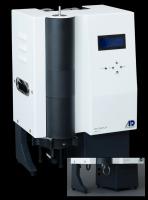最新消息 ﹥ 商品介紹 > Aerosol Devices
新一代氣膠採樣系統:Spot Sampler (Series 110 Universal)

The Spot Sampler™ particle collectors use well-known laminar-flow water condensation technology and gentle impaction for wet or dry collection.
The inherently pre-concentrated particle samples are ready
for laboratory chemical or biological analysis.
|
SPOT SAMPLER vs |
Filter Collection |
|
Collects particles dry, in liquid, or gel |
Collects particles dry on filter media |
|
Pre-concentrated sample |
Particle sample diluted in relatively large volume of extraction water/solvent |
|
High-efficiency particle collection |
Filter collection can be highly efficient, but extraction from the filter is much less efficient |
|
Humid, moderated temperatures < 30 ̊C maintain sample integrity and high microorganism recovery |
Desiccation from air flow through filter results in loss of volatile material and stress/kill microbes |
|
Automated analysis without user manipulation using PAL autosampler for sample prep and injection |
Labor intensive, multi-step processing to extract particles from filter and prep for analysis |
|
High quality sample on chemically compatible substrate; low contamination |
Filter artifacts; high contamination potential from manual processing steps |
|
Time-resolved samples on small, easily transported sample disk (dry collection) |
Difficult to obtain time-resolved samples; 24-hour sample period every 3rd or 6th day typical |
Several sequential Spot Sampler prototypes were tested in the field and compared to
standard filter collection methods and near-real time instruments.
Hourly ambient PM2.5 samples were collected for inorganic anion measurement and
the results compared well with those obtained using a Particle-into-Liquid System (PILS)
and URG-filters. Particle-bound polyaromatic hydrocarbons (PAHs) were also measured
with 12-hr time resolution for an uninterrupted period of 4 months.
Ambient particle concentrations measured with prototype samplers compared well
with those obtained using standard Teflon® filters.
See the publications and presentations.
PEEK® (left) and aluminum (right) containing ambient PM2.5 samples collected
over 12 and 6 hours respectively.

